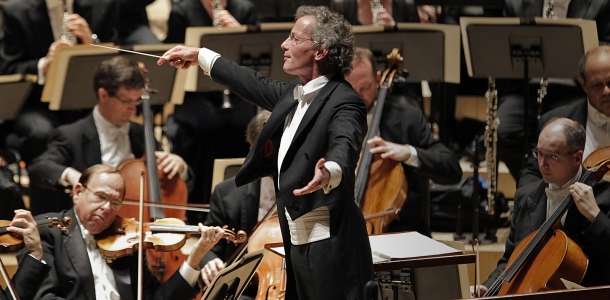|
Back
An Unusual Sole Concert by the Cleveland in New York New York
Carnegie Hall
11/13/2012 - & November 8, 10, 2012 (Cleveland)
Ludwig van Beethoven: Symphony No. 4 in B flat Major, Op. 60 – Grosse Fuge, Op. 133
Matthias Pintscher: Chute d’étoiles
Alexander Scriabin: The Poem of Ecstasy, Op. 54
Michael Sachs, Jack Sutte (trumpet)
Cleveland Orchestra, Franz Welser-Möst (conductor)

F. Welser-Möst (© IMG Artists)
It is unusual to hear the Cleveland Orchestra in only one performance at Carnegie Hall. Like other great orchestras of the world, it customarily gives a two or three-performance residency. But after its enormous successes in past seasons, one needed no excuse to give attention to this heavily romantic evening, its only Carnegie appearance in the current season.
The Cleveland has grown considerably under the capable baton of Franz Welser-Möst. I have often found his conducting too precise, too clinical, or perhaps even just too efficient, but last season’s concert performance of Richard Strauss’s Salome banished such thoughts from my mind. This new impression certainly held up in his fine Beethoven conducting. The composer’s Symphony No. 4 requires a lithe touch compared to the others, and the fine Cleveland players delivered it with an engaging but spirited lightness. So, too was the Grosse Fuge a fine model of musicianship. In both works the Cleveland’s strings gave especially impassioned playing.
Beginning the concert’s second part with the Grosse Fuge was badly needed after the evening’s experimental selection, Matthias Pintscher’s banal Chute d’étoiles for two trumpets and orchestra. The twenty-minute piece, which is supposed to be a musical homage to a sculpture installation by the artist Anselm Kiefer, assailed the ears as does bad horror movie music. Its brassy excesses strained the use of the trumpet solos to the point where one almost pitied the technically excellent players from the Cleveland’s brass section for having to stand there and perform it.
In addition to the second Beethoven piece, Welser-Möst scored a fine recovery with Scriabin’s florid Poem of Ecstasy, an early twentieth century paean to love, art, and the realization of dreams. Scriabin meant for the work to be accompanied by a poem declaring its author “a moment illuminating eternity” as well as “affirmation” and “ecstasy.” The Cleveland’s real strength is in the firmly classical repertoire which graced its Beethoven selections, but this performance raised the lustful Scriabin piece to these towering heights with a remarkably vigorous playing.
ConcertoNet is on Facebook
Twitter: @concertonet
Paul du Quenoy
|